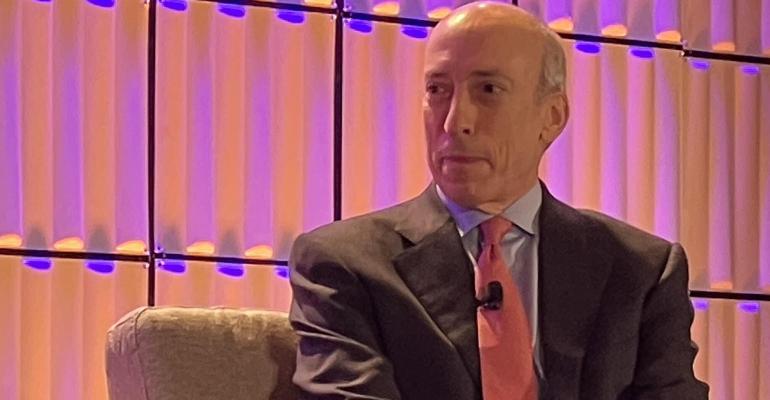Following this week’s SEC approval of its climate disclosure rule for issuers, some expect the proposed rule for ESG-touting funds and advisors to be imminent.
During a discussion at this year’s Investment Adviser Association Compliance Conference, Mara Shreck, a managing director in the office of regulatory affairs at JPMorgan Chase, said the corporate disclosure rule had taken “a lot of the oxygen out of the room.” Now that it was out, she expected the advisors’ rule to follow “very quickly.”
Shreck and IAA President Karen Barr also agreed that because the SEC pared back the climate rule’s scope from earlier versions, the industry could expect consistent disclosure requirements for advisors.
“They’ve been consistent in understanding the parallels,” Shreck said. “I would expect they’d be in lockstep.”
The commission voted 3-2 this week to finalize a rule mandating issuers disclose certain information about greenhouse gas emissions. SEC Chair Gary Gensler told reporters at the IAA conference that investors would get more “reliable and consistent” disclosures than what they currently get from companies voluntarily.
But the rule was pared back from its original version, proposed nearly two years ago. In the final version, issuers won’t have to disclose pollution from their supply chains known as Scope 3 emissions. (For many businesses, Scope 3 emissions account for as much as 70% of their carbon footprint, according to Deloitte.)
Scope 1 and Scope 2 emissions (the emissions a company makes directly and indirectly, respectively) are also not required for smaller companies or “growth companies,” according to IAA Associate General Counsel William Nelson, who moderated a panel at the IAA conference on ESG industry updates.
In May 2022, the commission proposed a separate ESG-related rule targeting "greenwashing," aiming to get investors more information about which funds and advisors are serious about ESG and which are marketing on the term rather than the substance.
The proposed rule would require funds and investment advisors to provide detailed disclosures on ESG strategies and methods in fund prospectuses, annual reports and advisor disclosure documents. At the time, the IAA generally supported the rule but worried its wording could lead to firms overemphasizing ESG factors in their disclosures.
While the proposal impacted asset managers most heavily, RIAs incorporating ESG strategies would also affected, particularly by proposed changes in Forms ADV.
However, Zeena Abdul-Rahman, a branch chief with the SEC’s Investment Management Division, noted during the conference that the proposal allows for tiered levels of disclosure depending on how important ESG is to a firm’s strategy and marketing.
Gensler declined to comment on the details of the upcoming rule (including whether any changes in the climate issuer rule reflect shifts in the ESG proposal), nor would he comment on the timetable. But he said the rule at its core centered on advisors and funds practicing “truth in advertising.”
“It’s about not misleading the public as to what you’re doing in a field,” he said. “Even under today’s rules, the Names rule, the marketing rule, one is not supposed to mislead the public about what you’re doing in a fund.”
The climate rule for issuers has already had strong pushback, with investor protection advocates decrying the loss of the Scope 3 mandates. At the same time, conservative critics said the commission was overstepping its authority.
Sen. Tim Scott (R-S.C.) said he planned to use the Congressional Review Act to try and overturn the rule, an effort Neil Simon, the IAA’s vice president, government relations, said was not going to succeed. According to Simon, even if it passed both chambers of Congress, President Joe Biden would likely veto it.
However, litigation against the rule was near inevitable, with Simon saying the U.S. Chamber of Commerce had former Trump Labor Secretary Eugene Scalia “on speed dial." Scalia has been a frequent litigant against Biden policies.





